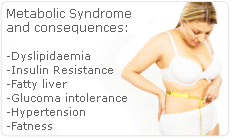
Menopause is a time of significant change for middle-aged women. An important time signaling the end of the reproductive cycle, menopause and its various symptoms greatly affect women's day to day life. Menopause causes dramatic changes in the levels of natural hormones in the body and such changes in natural hormones have been linked to increased risk of cardiovascular disease and metabolic syndrome. This study investigates these theories and looks at the impact of menopause on natural hormone testosterone levels.
Cardiovascular disease (CVD) is the main cause of death of women in the Western world, and women over 55 years are more likely than men to have CVD. Because of this, many scientists argue that changes in natural hormones during menopause and the symptoms of menopause can enhance the risk of CVD, as well as normal aging.
This research aimed to establish whether the risk of Metabolic Syndrome (MetS) increased with menopause and the symptoms of menopause, independent of age and other factors. It was also designed to test the premise that testosterone can develop MetS.
Menopause and the symptoms of menopause greatly affect a woman's body and how it functions. During menopause, levels of natural hormones in the body fluctuate. The most important of these natural hormones are estradiol and testosterone. Sex hormone-binding globulin (SHBG) is a protein that binds testosterone and estradiol and carries them to the necessary organs, though this binding favors the natural hormone testosterone.

Metabolic Syndrome affects 20% to 30% of older women and has been linked to the growth of both cardiovascular disease and diabetes. Menopausal status and the symptoms of menopause have been linked to elements of the MetS, but such results are somewhat questionable.
Menopause-related testosterone and prevalence seems to be a significant natural hormone change that affects Metabolic Syndrome, besides aging and other CVD risk factors.
Prior to this study, it was believed that estrogen had a direct, positive impact on the risk of cardiovascular disease in females, an effect that was lost as they progressed from a premenopausal to a postmenopausal state, and effectively lost the natural hormone estrogen. Yet, previous data reveals that changes in natural hormone estrogen levels do not significantly affect the risk of MetS in women.
This particular investigation is a longitudinal examination involving the largest group of middle-aged menopausal women to date. It shows that the occurrence of Metabolic Syndrome greatly increases during the perimenopausal and early postmenopausal years, independent of aging and other known CVD risk factors, including smoking and weight gain.
This investigation indicates that natural hormones like testosterone and Sex hormone-binding globulin (SHBG) can independently increase the risk of CVD. Menopause causes a loss of estrogen and the dominance of the natural hormone testosterone, one of the most important natural hormones, results in an increased risk of Metabolic Syndrome. Thus, menopause-related testosterone and prevalence seems to be a key natural hormone change that affects Metabolic Syndrome, besides aging and other CVD risk factors. However, it is worth noting that further exploration into such theories is needed.